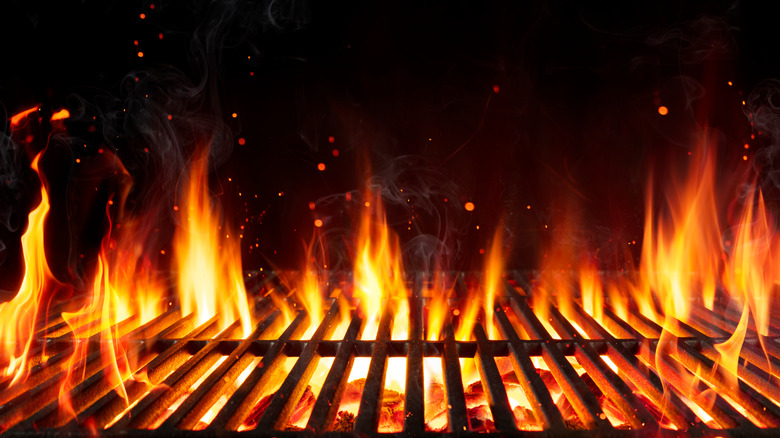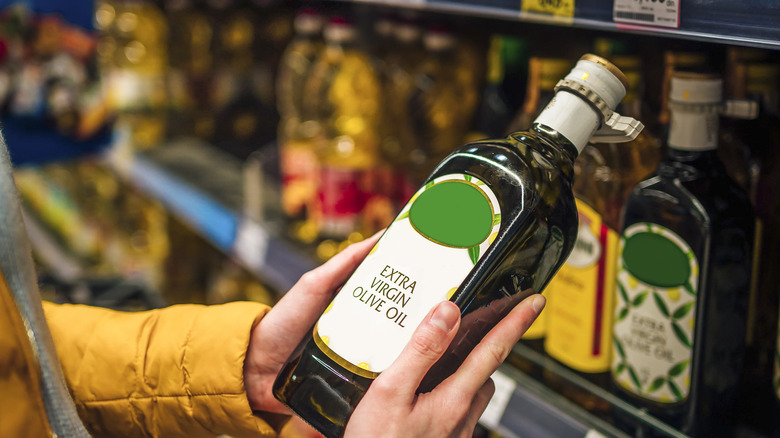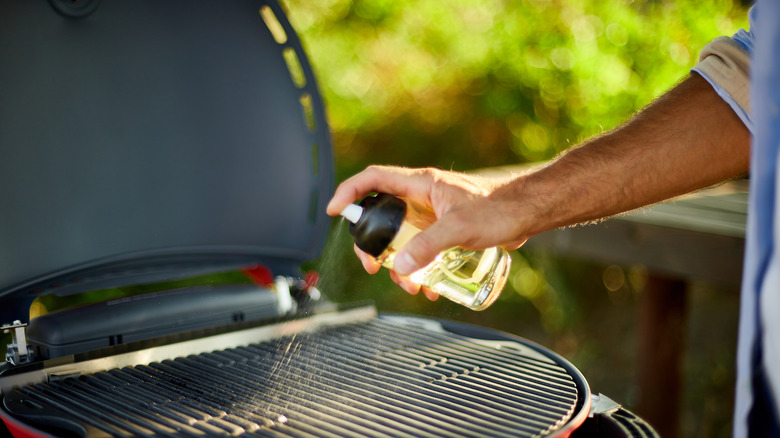Why Olive Oil Isn't The Best Option When It Comes To Your Grill
When it comes to grilling, there are really only a few very simple and important points you need to remember. First, don't burn anything (and for that matter, don't undercook anything, either). Second, make sure the food doesn't stick to the grill.
Grilling is an ideal way to cook up some steaks or salmon filets, but if your meat or vegetables stick to the grill, it will rip the food to shreds. Not only will you lose your precious grill marks on your food, but you'll also lose moisture when the seared seal around the meat is torn apart. For this reason, you always need to keep your grill grates clean and be sure to rub them down with cooking oil before you start cooking. Don't reach for a fancy olive oil for this job, however. Most olive oils have a low smoke point, so when they come into contact with the high heat of the grill they'll start to break down, burn, and add off-odors to your food. Good olive oil is expensive, too, especially extra virgin varieties, and it's a waste of money to slather it all over the grill only to watch it go up in smoke.
If you want to make sure your grill is greased up and ready to go, reach for a cooking oil with a higher smoke point, like peanut, canola, or avocado oil. These high-heat-friendly oils won't impart any off flavors and typically cost less than most well-made olive oils.
Smoke points
Olive oil has been around for thousands of years, and it's packed with lots of heart-healthy antioxidants like polyphenols, it's low in saturated fat, and it's known to help balance good and bad cholesterol. It's not the end-all when it comes to cooking, however, because when it reaches a temperature of around 360 degrees Fahrenheit, it starts to break down and, well, smoke. When oil breaks down, it begins to release acrolein, which is a not-so-great chemical that makes food taste burnt. So even if you cook your burgers perfectly without burning them, they can still taste a bit like a campfire if you oil the grill grates with olive oil.
Other oils have higher smoke points, which are more appropriate for seasoning the grill. Avocado oil, for example, has a smoke point of over 500 degrees Fahrenheit. Canola oil, which is probably the least expensive choice, clocks in at around 400 to 475 degrees Fahrenheit, and peanut oil is also around 450 degrees Fahrenheit. Since a gas grill often reaches temperatures of around 400 to 500 degrees Fahrenheit, and a charcoal grill much hotter, it makes sense to use something that can stand up to those high temps.
Save olive oil for flavor
Using olive oil on your grill grates probably won't hurt you as long as you're not eating acrolein every day. However, good olive oil is best saved for eating, not greasing the grill. Most high-end extra virgin olive oil (EVOO) is cold pressed, which means that the oil was extracted without using heat. This is done because heat will destroy the volatile chemicals in the oil which give it unique aromas. So it doesn't make sense to swab an expensive cold-pressed olive oil on a 500-degree Fahrenheit grill. Truly great olive oil has nuances just like wine, including flavors of pepper, grass, hay, and butter. They're really best when you use them for dipping a crusty piece of baguette, or for making a fresh vinaigrette for salad.
A few olive oils do have higher smoke points, however, so if you've only got olive oil on hand do a little research on the label and online before you start cooking to see if you can find out its smoke point. If you can't find out about the smoke point, don't chance it. There are plenty of alternative oils that will properly coat the grill so that you can make the perfect New York strip steak. Oil up the barbie with something cheaper, and save your EVOO for drizzling on top of your dinner before serving.


